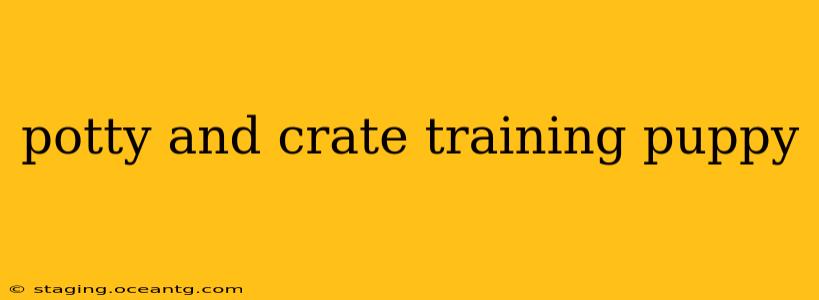Bringing home a new puppy is an exciting time, filled with playful cuddles and endless puppy kisses. However, it also marks the beginning of a crucial phase: potty and crate training. This process requires patience, consistency, and a deep understanding of your puppy's needs. This comprehensive guide will walk you through the steps, addressing common questions and concerns to help you navigate this important journey.
What is the best way to potty train a puppy?
Potty training success hinges on establishing a predictable routine and rewarding good behavior. Start by taking your puppy outside frequently – immediately after waking up, after meals, after playtime, and every couple of hours. Choose a designated potty spot and always take your puppy there. When your puppy eliminates outside, praise them enthusiastically with positive reinforcement like treats or verbal praise. Accidents will happen; clean them up thoroughly without scolding your puppy. Consistency is key – everyone in the household needs to follow the same routine.
How do I crate train my puppy?
Crate training offers a safe and secure space for your puppy, aiding both potty and overall training. Introduce the crate gradually, making it a positive experience. Place comfortable bedding inside and feed your puppy meals in the crate. Never use the crate as punishment. Start with short periods inside the crate and gradually increase the time. Supervise your puppy closely to avoid accidents. If your puppy whines, wait a few minutes before responding. This teaches them self-soothing.
What are some common mistakes to avoid during potty training?
A common mistake is inconsistent routines. Another is punishing your puppy for accidents. This can create fear and anxiety, hindering the learning process. Ignoring accidents is also incorrect; always clean thoroughly using an enzymatic cleaner to eliminate the scent and avoid repetition. Finally, expecting perfection too quickly is unrealistic. Celebrate small victories and remain patient throughout the process.
How long does it take to potty train a puppy?
Potty training timelines vary depending on breed, age, and individual personality. Generally, it takes several months for a puppy to become reliably house trained. Smaller breeds may learn faster than larger breeds. Consistency and patience are key determinants of success.
How often should I take my puppy outside to potty?
The frequency depends on your puppy's age and size. A very young puppy might need to go every hour or even more frequently. As they get older, you can gradually increase the intervals between potty breaks. A good rule of thumb is to take your puppy out after each period of sleep, play, and eating.
What are the signs my puppy needs to potty?
Puppies often display subtle cues when they need to eliminate. These can include circling, squatting, whining, or sniffing the ground intensely. Pay attention to these signs and take your puppy outside immediately. Early detection is vital for successful potty training.
My puppy is having accidents in the house – what should I do?
Accidents happen. Don't punish your puppy; simply clean the area thoroughly. Increase the frequency of potty breaks, and reassess your training methods. Consider if there are any underlying medical issues. If accidents persist, consult your veterinarian.
Should I use puppy pads for potty training?
Puppy pads can be convenient, but they can actually hinder potty training in the long run. Puppies might learn to associate these pads with eliminating indoors rather than outdoors. It's generally recommended to stick to outdoor potty training from the start for more effective results.
When can I start leaving my puppy alone?
Gradually increase your puppy's alone time as their crate training progresses and their potty training improves. Start with short periods and reward calm behavior in the crate. Never leave a puppy unsupervised for extended periods, especially in the early stages of training.
How do I know if my puppy is fully potty trained?
A puppy is considered fully potty trained when they consistently eliminate outside, reliably hold their bladder and bowels overnight, and rarely have accidents. This typically takes several months, and even then, occasional accidents can occur, especially under stress or excitement.
By diligently following these steps and remembering the importance of patience and consistency, you'll successfully navigate the world of puppy potty and crate training. Enjoy the journey and the rewards of a well-trained companion!
